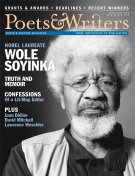Readers who have grown cynical (and tired) are probably eager for one less magazine to be published. The rest will probably rejoice in the publication of One Less Magazine (onelessmag.blogspot.com), the new biannual journal edited by David Gardner and Nikki Widner in Williamsburg, Massachusetts. Published by—you guessed it—One Less Press and distributed by Bernard DeBoer, each issue of One Less features work compiled around a theme. The second issue, titled Collection(s), published late last year, includes letters, rummy scores, found poems, paintings of shoes, and a map of receipts, among other things. In short, it's a collection of art and writing that takes as its subject the stuff people collect, thereby elevating the habit of collecting to an art form. The theme of the third issue, due later this year, is film.
For more than two decades, the Women's Review of Books (www.wcwonline.org/womensreview), published by the Wellesley Centers for Women (WCW) at Wellesley College in Massachusetts, offered readers a monthly selection of reviews of poetry, fiction, and nonfiction books by and about women, as well as essays, poems, and author interviews. After years of operating at a deficit while the number of its subscribers plummeted—from twelve thousand in 1992 to less than six thousand at the end of 2004—the Women's Review of Books ceased publication with its December 2004 issue. But its editor, Amy Hoffman, did not let the magazine go gentle into that good night. Okay, so maybe she didn't rage against the dying of the light, but she did use her time off wisely. Over the following year she established a new partnership between the WCW and Old City Publishing, a small publisher of journals and books in that city of brotherly and sisterly love, Philadelphia. As a result, the Women's Review of Books relaunched as a bimonthly tabloid in January 2006. The editorial offices will continue to be located at the WCW; Old City Publishing will house the advertising and production offices, in addition to a—hopefully very busy—subscription fulfillment department.
Distinguishing theirs from other "city reviews" such as Milwaukee's Cream City Review (www.uwm.edu/Dept/English/ccr), New York's Global City Review (www.webdelsol.com/globalcityreview/index.html), and Austin's Bat City Review (www.batcityreview.com), the editors of Backwards City Review (www.backwardscity.net), the literary magazine published in Greensboro, North Carolina, reserve approximately 10 percent of each biannual issue for comic lit. On their Web site, coeditors Gerry Canavan, Tom Christopher, Don Ezra Cruz, Patrick Egan, and Jaimee Hills define the genre as comics and other pictorial works that engage the reader in a narrative manner: "We do not want the funny pages," adding, "humorous graphic narrative should be witty, and we will not accept superheroes unless they are creative and different." Of course, if comic lit doesn't float your boat—even if the superheroes are creative and different—Backwards City Review features plenty of poetry and prose sans illustrations. Previous contributors include poets Joyelle McSweeney, Tony Tost, and Sarah Manguso, and fiction writers Michael Parker, Matthew Simmons, and Sarah Blackman.
Considering the much-deserved hubble-bubble surrounding each year's National Poetry Month—and the primary mission of its sponsor, the Academy of American Poets—it is noteworthy that the April issue of Poetry (www.poetrymagazine.org) is devoted to new translations of poems from twenty-two languages by thirty-two translators, including Richard Pevear and Larissa Volokhonsky, whose previous translations from the Russian include classics by Dostoevsky, Tolstoy, Gogol, and Bulgakov; Seamus Heaney; Richard Wilbur; Clare Cavanagh; and W.S. Merwin. Each poem is accompanied by a translator's note, providing a context and an insight into the translation process. "I think this is probably the best issue since I've been editor," says Christian Wiman.
Kevin Larimer is the senior editor of Poets & Writers Magazine.








